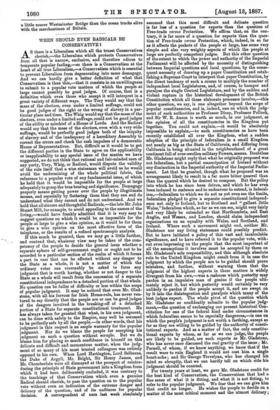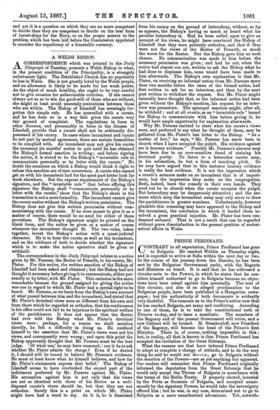WHEN SHOULD EVEN RADICALS BE correct the errors and cheek
the rash impulses of a democratic adoption of the principle of federalism in a small Kingdom House of Representatives. But, difficult as it would be to get not nearly as big as the State of California, and differing from the different parties in the State to agree on the applicability California in being situated in the neighbourhood of a great or inapplicability to any special issue of the maxim we have continent full of over-swollen military Powers, means. Doubtless suggested, we do not think that rational and fair-minded men of Mr. Gladstone might reply that what he originally proposed was any party, Tory, Whig, or Radical, would dispute the validity not federalism, but a partial emancipation of Ireland without of the rule itself that a wise statesman will avoid as he would any diminution in the Imperial authority of the Imperial Paula.. avoid the undermining of the whole political fabric, the ment. Let that be granted, though what he proposed was an reference to a popular vote of any fundamental issue, of which arrangement likely to result in a far more bitter quarrel than he held that it would be impossible for the people at large than the quarrel which he desired to compose. Bat the policy adequately to grasp the true bearing and significance. Demagogy into which he has since been driven, and which he has even properly means getting power over the people by illegitimate been induced to embrace and to endeavour to extend, is federal- means, and especially by flattering them that they can and do ism,—federalism to which we do not as yet even see the limits, understand what they cannot and do not understand. And we federalism pledged to give a separate constitutional independ- hold that all sincere and thoughtful Radicals,—the late Mr. ,Tohn ence not only to Ireland, but to Scotland and "gallant little Stuart Mill, for example, to avoid appealing to the names of the Wales," federalism which, so far as we can see, might very fairly living,—would have frankly admitted that it is very easy to and very likely be extended so that Northumbria, and East suggest questions on which it would be as impossible for the Anglia, and Wessex, and London, should claim independent people at large to give a wise opinion, as it would be for them organisations on an equality with Wales, and Scotland, and to give a wise opinion on the most effective form of the Ireland. Where such a movement might end, neither Mr. telephone, or the results of a refined spectroscopic analysis. Gladstone nor any living statesman could possibly predict. If this much be granted, then we may go a little further, But to have initiated a policy of this vast and incalculable and contend that, whatever view may be taken of the corn- significance, and to have referred it to the populir vote, with- potency of the people to decide the general issue whether a out even impressing on the people that the most important of separate sphere of self-government ought or ought not to be all the assumptions it involves mud be accepted by them on accorded to a particular section of the realm of which it forms Mx. Gladstone's sole responsibility, and this although absolute a part in case that can be effected without any danger to ruin to the United Kingdom might result from it in case the the State as a whole, it is not a matter of which the judgment by which the people are to be guided should prove ordinary voter can reasonably be asked to form any mistaken, and further, without warning them that the judgment that is worth having, whether or not danger to the judgment of the highest experts in these matters is widely State as a whole will result from the concession of a separate divergent from his own,—was a rashness which posterity may constitutional independence to a detached portion of that whole, pardon in an impulsive man of genius if the people ulti- No question can be fuller of difficulty or less within the scope mately reject it, but which posterity would certainly be very of popular judgment. It may be noticed that even Mr. Glad- unlikely to pardon if the people accept it, and are swept on stone, with all his fervour for Irish Home-rule, has never yen- by it into the disintegration and paralysis which many of the tured to say directly that the people are or can be good judges beat judges expect. The whole pivot of the question which of the dangers involved in the breaking-off of a detached Mr. Gladstone so confidently submits to the popular judg- portion of a State for separate constitutional treatment. He ment,—the question of exchanging our present historical Con- has always taken for granted that what, in his own judgment, stitution for one of the federal kind under circumstances in can be done with safety to the Empire, may well be assumed which federalism seems to be especially dangerous,—is one on to be perfectly safe by all the people,—in other words, that his which the people's judgment is not worth a farthing, except so judgment in this respect is an ample warranty for the popular far as they are willing to be guided by the authority of consti- judgment. Nor do we blame the people for accepting his tutional experts. And as a matter of fact, the only constitu- judgment on such a question without scruple. But we do tional experts by whom, as far as we can judge, the people blame him for placing so much confidence in himself on this are likely to be guided, are such experts as Mr. Gladstone, delicate and difficult and momentous matter, when the judg- who has never once discussed the real gravity of the issue ; Mr. ment of so many of his most trusted colleagues was entirely Parnell, of whom, if we know anything, we know that if the opposed to his own. When Lord Hartington, Lord Selborne, result were to ruin England it would not cost him a single the Duke of Argyll, Mr. Bright, Sir Henry James, and heart-ache ; and Sir George Trevelyan, who has changed his Mr. Chamberlain were all dismayed at the prospect of reintro- mind so abruptly, that we can hardly tell on which side his ducting the principle of State government into a Kingdom from judgment should be counted. which it had been deliberately excluded, it was contrary to For twenty years at least, we gave Mr. Gladstone credit for the teachings of that Conservatism which even a genuine the best kind of Conservatism, the Conservatism that had a Radical should cherish, to pass the question on to the popular fine sense of what it is fitting, and what it is not fitting, to vote without even an indication of the extreme danger and refer to the popular judgment. We fear that we can give him delicacy of the question, and of its unfitness for popular that credit no longer. He wishes the people to decide on a decision. A correspondent of ours lest week absolutely matter of the most oritical moment and the utmost delicacy ; a little nearer Westminster Bridge than the ocean tracks alive assumed that this most difficult and delicate question with the merchantmen of Britain. is far less of a question for experts than the question of Free-trade versus Protection. We affirm that, on the con- trary, it is far more of a question for experts than the ques- tion of Free-trade versus Protection, which, indeed, in so far CONSERVATIVE? as it affects the pockets of the people at large, has some very
AS there is a Liberalism which all the truest Conservatives simple and also very weighty aspects of which the people at cherish,—the Liberalism which protects Conservatives large are perfectly competent judges. But this other question from all that is narrow, exclusive, and therefore odious to of the extent to which the power and authority of the Imperial temperate popular feeling,--so there is a Conservatism at the Parliament will be affected by the necessity of distinguishing heart of all true Liberalism,—a Conservatism which is essential between Imperial questions and local questions, by the conse- to prevent Liberalism from degenerating into mere demagogy. quent necessity of drawing up a paper Constitution and estab- And we can hardly give a better definition of what that lishing a Supreme Court to interpret that paper Constitution, by Conservatism is than this,—that it consists in an unwillingness the direct tendency of such a course to multiply the number of to submit to a popular vote matters of which the people at independent local Legislatures, and, of course, to hamper and large cannot possibly be good judges. Of course, that is a paralyse the single Central Legislature, and by the sudden and definition which even those who accept it will interpret in a violent rupture in the historical development of the British great variety of different ways. The Tory would say that the Constitution which all these elaborate processes involve,—this mass of the electors, even under a limited suffrage, could not other question, we say, is one altogether beyond the scope of be good judges of the right or the wrong of slavery in a par- popular constituencies, and is, indeed, one on which the judg- ticular place and time. The Whig would say that the mass of the ment of such authorities as Professor Dicey, Professor Pollock, electors, even under a limited suffrage, could not be good judges and Sir W. R. Anson is worth as much, in our judgment, as of the utility or mischief of a House of Lords. And the Radical the opinion of all the constituencies in the Kingdom put would say that the mass of the electors, even with a very wide together. You could not explain,—it would be absolutely suffrage, would be perfectly good judges both of the iniquity impossible to explain,—to such constituencies as have been of slavery and of the inadequacy of a hereditary Assembly to recently established all over the Kingdom, what a sudden
and yet it is a question on which they are no more competent to decide than they are competent to decide on the best form of turret-ships for the Navy, or on the proper answer to the problem which has been laid before the Commission appointed to consider the expediency of a bimetallic currency.



































 Previous page
Previous page